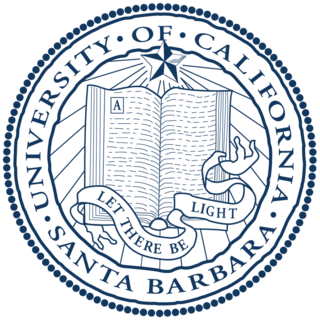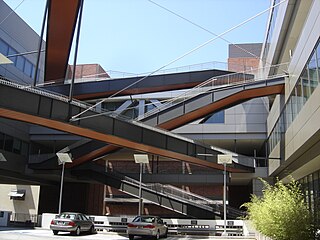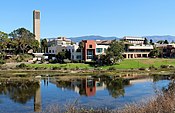
The University of California, Santa Barbara, is a public land-grant research university in Santa Barbara, California, United States. It is part of the University of California university system. Tracing its roots back to 1891 as an independent teachers' college, UCSB joined the ancestor of the California State University system in 1909 and then moved over to the University of California system in 1944. It is the third-oldest undergraduate campus in the system, after UC Berkeley and UCLA. Total student enrollment for 2022 was 23,460 undergraduate and 2,961 graduate students.

David Jonathan Gross is an American theoretical physicist and string theorist. Along with Frank Wilczek and David Politzer, he was awarded the 2004 Nobel Prize in Physics for their discovery of asymptotic freedom. Gross is the Chancellor's Chair Professor of Theoretical Physics at the Kavli Institute for Theoretical Physics (KITP) of the University of California, Santa Barbara (UCSB), and was formerly the KITP director and holder of their Frederick W. Gluck Chair in Theoretical Physics. He is also a faculty member in the UCSB Physics Department and is affiliated with the Institute for Quantum Studies at Chapman University in California. He is a foreign member of the Chinese Academy of Sciences.

Finn Erling Kydland is a Norwegian economist known for his contributions to business cycle theory. He is the Henley Professor of Economics at the University of California, Santa Barbara. He also holds the Richard P. Simmons Distinguished Professorship at the Tepper School of Business of Carnegie Mellon University, where he earned his PhD, and a part-time position at the Norwegian School of Economics (NHH). Kydland was a co-recipient of the 2004 Nobel Memorial Prize in Economics, with Edward C. Prescott, "for their contributions to dynamic macroeconomics: the time consistency of economic policy and the driving forces behind business cycles."
Jewish studies is an academic discipline centered on the study of Jews and Judaism. Jewish studies is interdisciplinary and combines aspects of history, Middle Eastern studies, Asian studies, Oriental studies, religious studies, archeology, sociology, languages, political science, area studies, women's studies, and ethnic studies. Jewish studies as a distinct field is mainly present at colleges and universities in North America.

Galen D. Stucky is an American inorganic materials chemist who is a Distinguished Professor and the Essam Khashoggi Chair In Materials Chemistry at the University of California, Santa Barbara. He is noted for his work with porous ordered mesoporous materials such as SBA-15. He won the Prince of Asturias Award in 2014, in the Scientific and Technological Research area. Stucky was elected a member of the American Association for the Advancement of Science in 1994, a member of the American Academy of Arts and Sciences in 2005, and a member of the National Academy of Sciences in 2013.

The Gevirtz Graduate School of Education is a graduate school at the University of California, Santa Barbara which specializes in the field of education and counseling, clinical and school psychology. It is located in technology-enabled Education Building which has been built in 2009 on the UCSB campus. In 2013, the Gevirtz School was once again named one of the best graduate schools of education in the United States by U.S. News & World Report. In addition to its graduate programs, it also contains the Koegel Autism Center, Hosford Counseling & Psychological Clinic, the Psychology Assessment Center, and the McEnroe Reading & Language Arts Clinic. The Gevirtz School has a pre-K – 6 laboratory school, The Harding University Partnership School, in the Santa Barbara Unified School District.

The College of Engineering (CoE) is one of the three undergraduate colleges at the University of California, Santa Barbara.

The California NanoSystems Institute (CNSI) is an integrated research center operating jointly at UCLA and UC Santa Barbara. Its missions are to foster interdisciplinary collaborations for discoveries in nanosystems and nanotechnology; train the next generation of scientists, educators and technology leaders; and facilitate partnerships with industry, fueling economic development and the social well-being of California, the United States and the world.

The Cheadle Center for Biodiversity and Ecological Restoration (CCBER) is a research center under the Office of Research at the University of California, Santa Barbara (UCSB) whose mission is to preserve regional biodiversity and restore ecosystems on campus lands. CCBER has three main functions: curation and preservation of natural history collections, native coastal ecosystem and habitat restoration on campus lands, and education and outreach for both UCSB students and local community schools.
Charles D. Kolstad is an American economist, known for his work in environmental economics, environmental regulation, climate change and energy markets. He is professor and senior fellow at Stanford University. Prior to his appointment at Stanford, he was professor of economics at the University of California, Santa Barbara, appointed to both the Bren School of Environmental Science & Management and the department of economics. Kolstad was also chair of the UCSB Department of Economics and co-director of the University of California Center for Energy & Environmental Economics. He has previously held a wide variety of academic positions, including at the University of Illinois, Harvard University, Stanford University and MIT.
The Physics Department at the University of California, Santa Barbara has 58 faculty members. It offers academic programs leading to the B.A., B.S., and Ph.D. degrees.
The Center for Spatial Studies and Data Science (@spatial) is a research center at the University of California, Santa Barbara built on a rich legacy of providing visionary and interdisciplinary leadership in geographic data science. Formerly named the Center for Spatial Studies, @spatial was founded in 2008 by Michael Goodchild, and focuses on spatial thinking across domains, spatial intelligence, geoinformatics, geographic information science, and geographic information systems.
Carol E. Genetti is an American linguist who is known for her research into Tibeto-Burman languages and languages of the Himalayans.

Matthew Barth is a professor of Electrical and Computer Engineering and associate dean for research and graduate education in the Bourns College of Engineering at the University of California, Riverside. He was named Fellow of the Institute of Electrical and Electronics Engineers (IEEE) in 2014 for his research in intelligent transportation systems.
Francis "Frank" J. Doyle III is an American engineer and academic administrator. He is the dean of the Harvard John A. Paulson School of Engineering and Applied Sciences and the John A. and Elizabeth S. Armstrong Professor of Engineering and Applied Sciences. Doyle is also affiliated with the Division of Sleep Medicine of Harvard Medical School. On December 15, 2022, it was announced that Doyle will serve as the 14th provost of Brown University starting in the 2023 academic year.
Alison Butler is a Distinguished Professor in the Department of Chemistry and Biochemistry at the University of California, Santa Barbara. She works on bioinorganic chemistry and metallobiochemistry. She is a Fellow of the American Association for the Advancement of Science (1997), the American Chemical Society (2012), the American Academy of Arts and Sciences (2019), and the Royal Society of Chemistry (2019). She was elected a member of the National Academy of Sciences in 2022.
Katherine Birgitta Whaley is a professor of chemistry at the University of California Berkeley and a senior faculty scientist in the Division of Chemical Sciences at Lawrence Berkeley National Laboratory. At UC Berkeley, Whaley is the director of the Berkeley Quantum Information and Computation Center, a member of the executive board for the Center for Quantum Coherent Science, and a member of the Kavli Energy Nanosciences Institute. At Lawrence Berkeley National Laboratory, Whaley is a member of the Quantum Algorithms Team for Chemical Sciences in the research area of resource-efficient algorithms.
Xia Zhou is an associate professor in the Department of Computer Science at Dartmouth College. Her current research centers on light. She co-directs the DartNets Lab and the Dartmouth Reality and Robotics Lab (RLab). She was a visiting faculty in National Taiwan University from December 2016 to February 2017, and in University of Cambridge from April 2017 to June 2017.
The Institute for Energy Efficiency (IEE) is a research institute of the University of California, Santa Barbara (UCSB). IEE is an interdisciplinary research institute dedicated to the development of science and technologies that increase energy efficiency, reduce energy consumption, and support an efficient and sustainable energy future.









